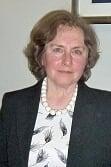Weekly Meeting - Perestroika - Before and After (Maria Lees)
Wed, Mar 6th 2019 at 7:30 pm - 7:30 pm
Friend: TBA
VOT: TBA

Club members please log in for more information.
Perestroika - Before and After (Maria Lees)
Maria Lees, accompanied by her husband, David, entertained us all with a very insightful talk on Perestroika, before and after.
Maria was educated in Russia, studied languages, literature and speaks six languages. Following the end of her formal education, not joining the communist party was against the norm, and restricted the career opportunities normally available to well-educated people.
Early in her career Maria found work as a translator in the medical area. Maria then went on to work for a French bank based in Mosco, the first none Russian bank ever to open in Russia. This was a commercial bank as the population only dealt in cash. The job involved mediating between the bank and Russian business. Foreign travel for Russians at this time was not allowed without significant paperwork, but due to working for European companies, Maria traveled widely. Ultimately Maria settled in the UK and became a UK citizen.
The talk began with her early education which was comprehensive and enjoyable. It was clear that prior to Perestroika, Russia delivered good education and health care. Living conditions where not so good with state operated accommodation and restricted food. Some families where allocated flats 20m2
Maria explained that leading up to Perestroika the Russian economy was failing, the Stalinist approach of centralized control was not working. During this time the media was completely controlled by the government and most people had very little confidence in what they where being told. These problems led senior Russian officials to realized that the country had to be more market led to attract foreign investment. This was the start of Perestroika.
During the lead up to Perestroika, Gorbachev was a senior government official promoting change, this ultimately led him to being appointed to president.
Maria believes that Gorbachev’s intentions where good but surrounded by institutions that where set in their ways, Perestroika took too much time to implement. During this time significant changes did take place, including the break up of the USSR and the Berlin wall coming down.
Slow implementation of Perestroika led to the Russian population becoming frustrated, leading to an election. Gorbachev was replaced by Boris Yeltsin, Yeltsin overturned some of the market orientated policies and began to remove the freedom recently bestowed on the press. Yeltsin was then replaced by Putin.
Maria expressed her concerns regarding Putin’s Russia moving back to pre-Perestroika politics, restrictions on the press and the involvement in previous USSR countries, The Crimea being an example.
